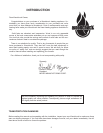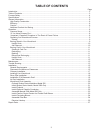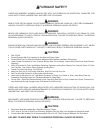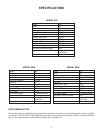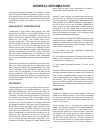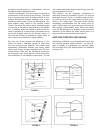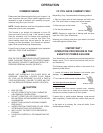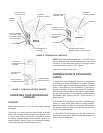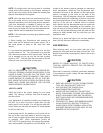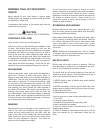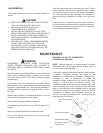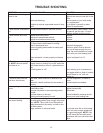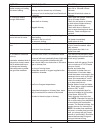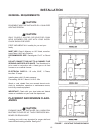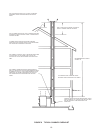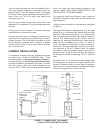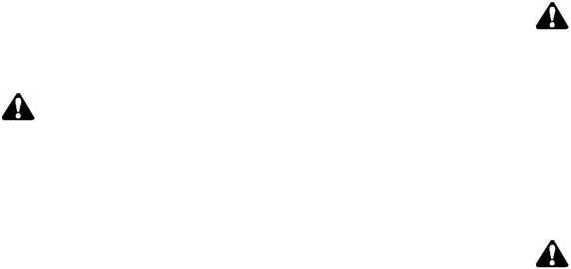
10
NOTE: On airtight units, the burning time is controlled
mostly by the draft controls on the furnace, contrary to
the old type of pot belly stoves where the smoke pipe
damper controlled the burning time.
NOTE: With new steel, there is a small amount of oil or
dirt on the metal and you may smell an odor. Provide
adequate ventilating to home during the first operation.
Your new Woodchuck is capable of putting out many
BTU’s, so treat it with respect. Don’t fully load your fur
-
nace or open all drafts fully until you have become thor
-
oughly familiar with the operation of the furnace.
NOTE: A full load does not always give the best results
for your needs.
4. When loading your Woodchuck with existing hot
coals, rake red hot embers over grates evenly. Put a
few small pieces of wood on the coals first, then
load-up.
5. If you have the automatic draft control, turn low limit
by-pass switch to “On”. Turn thermostat up to activate
auto draft and proceed as with manual draft. Once the
unit is warmed up you can turn the low limit by-pass
switch to “OFF”. This will allow the auto draft to shut off
if the unit runs out of fuel while you are gone.
CAUTION:
WAIT 10 SECONDS ON FIRST LATCH BEFORE RE-
FUELING. OPENING LOADING DOOR RAPIDLY CAN
CAUSE A FLAME TO FLASH OUT THE DOOR. THIS
OCCURS WHEN THERE IS UNBURNT FUEL AND A
LARGE AMOUNT OF GASES ON TOP OF THE FIRE
-
BOX. WHEN THE DOOR IS OPEN, OXYGEN IS COM
-
BINED WITH GASES AND IGNITES. USE CAUTION
WHEN OPENING LOADING DOOR.
HELPFUL HINTS
Adjust the draft to the proper setting for your home
needs. The chimney, hookups, and kind of wood will
also be a factor.
Your Woodchuck is capable of holding very large logs.
DO NOT try to add a log that is larger than you can
easily place in the furnace. You will get the best effi
-
ciency when you add only the amount of wood needed
fora6to8hour burn.
In the spring and fall, the weather is mild, which will al
-
low you to burn very large loads of wood for long peri
-
ods of time and hence accumulate very large amounts
of creosote. KEY: Stack temperature should be
300°F-400°F for good burning. An external flue temper
-
ature thermometer (Woodchuck part #08-0084) is in
-
cluded in the owner’s manual package for monitoring
stack temperature. Install the flue temperature ther
-
mometer at the rear of the furnace on the smoke pipe
where it connects to the collar on the back of the
Woodchuck. 300-400 degrees should be maintained
when the Woodchuck is operating in the burn cycle with
the forced draft blower running to eliminate a creosote
build up. (If the unit has a manual draft or a natural
draft, monitor the flue temperature when the drafts are
in the open position). Depending on the weather, you
may not need a full load of wood for a good over night
burn. You will get best efficiency when you add only the
amount of wood needed until the next time you are
available to load.
Always try to place the logs so air can flow between
them -this will enhance combustion considerably.
ASH REMOVAL
When burning wood, run your poker over top of the
grate to be sure grate slots are clear of burnt fuel. This
should be done every morning when there is just a bed
of hot coals.
CAUTION
NEVER LET ASHES BUILD-UP TO GRATE LEVEL.
THIS WILL GREATLY REDUCE THE LIFE SPAN OF
YOUR GRATE.
Wood ash is useful as a fertilizer, particularly because
of its potassium content. Ashes will also decrease the
acidity of garden soil.
CAUTION
·
KEEP ASH PAN OUT OF UNIT DURING OPERA
-
TION. ASH PAN CAN GET VERY HOT.
·
ASH CAN MUST BE PLACED ON A
NONCOMBUSTIBLE SURFACE.
·
NEVER USE ANYTHING BUT AN AIR TIGHT
METAL CONTAINER TO DUMP YOUR ASHES IN.
EVERY YEAR MANY FIRES ARE CAUSED BY
EMPTYING ASHES INTO CARDBOARD BOXES
OR PAPER BAGS.
·
PROVEN FACT- SMALL RED EMBERS BURIED
IN ASH CANS STAY RED HOT FOR DAYS.
ASHES ARE A GOOD THERMAL INSULATOR
AND KEEP ENOUGH OXYGEN AWAY SO THE
EMBERS DO NOT BURN OUT.



